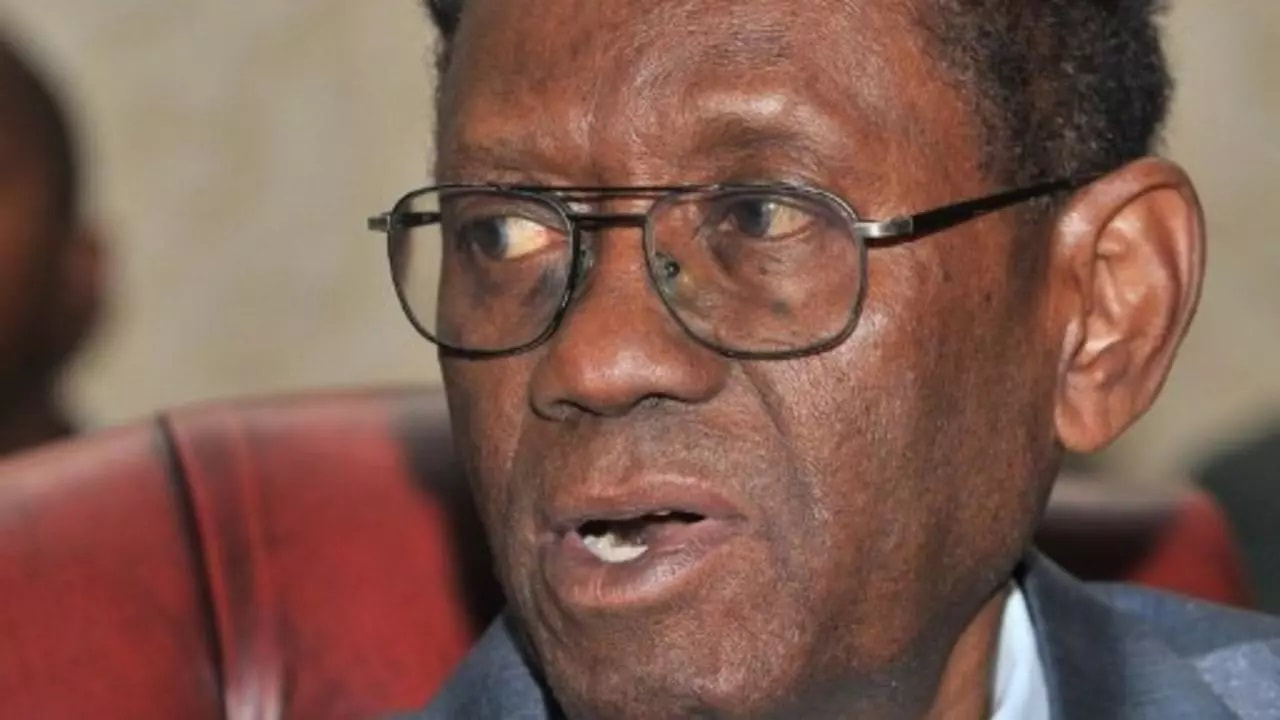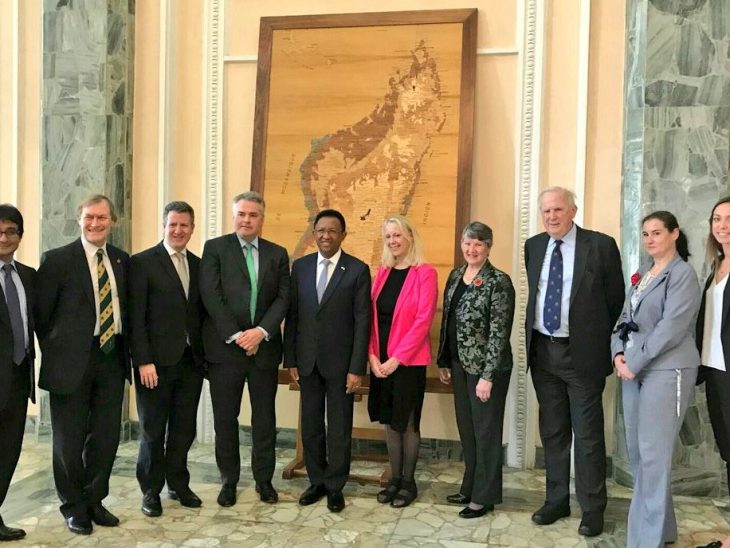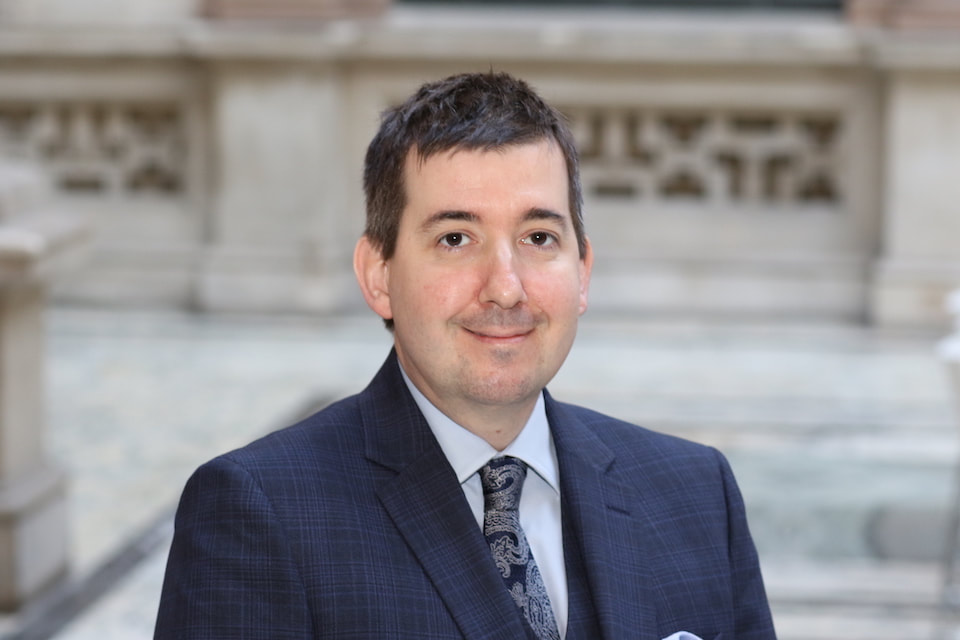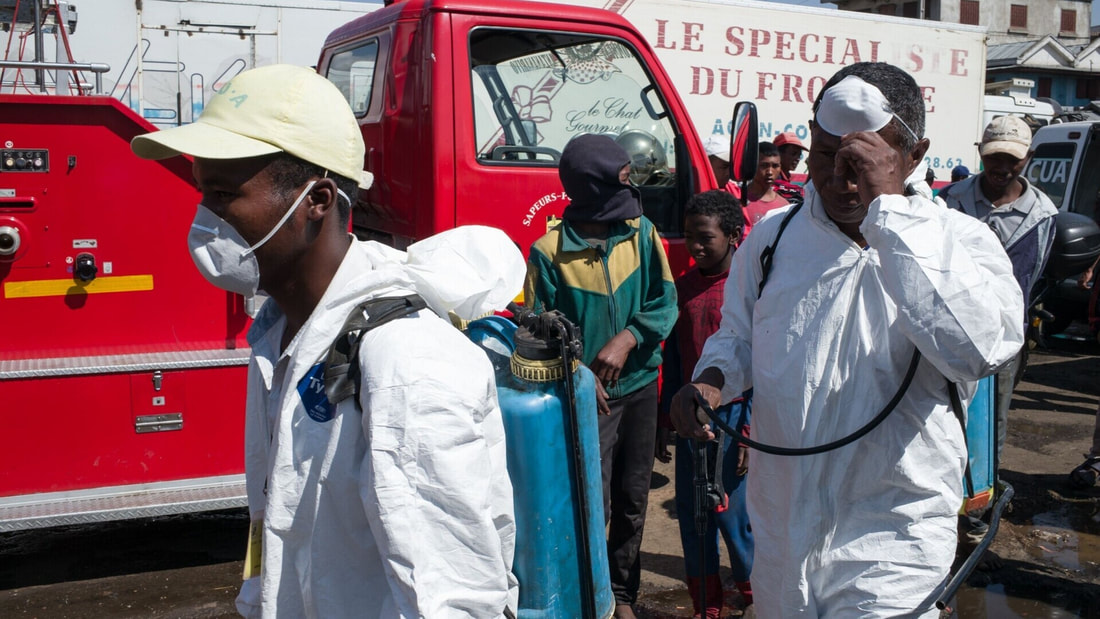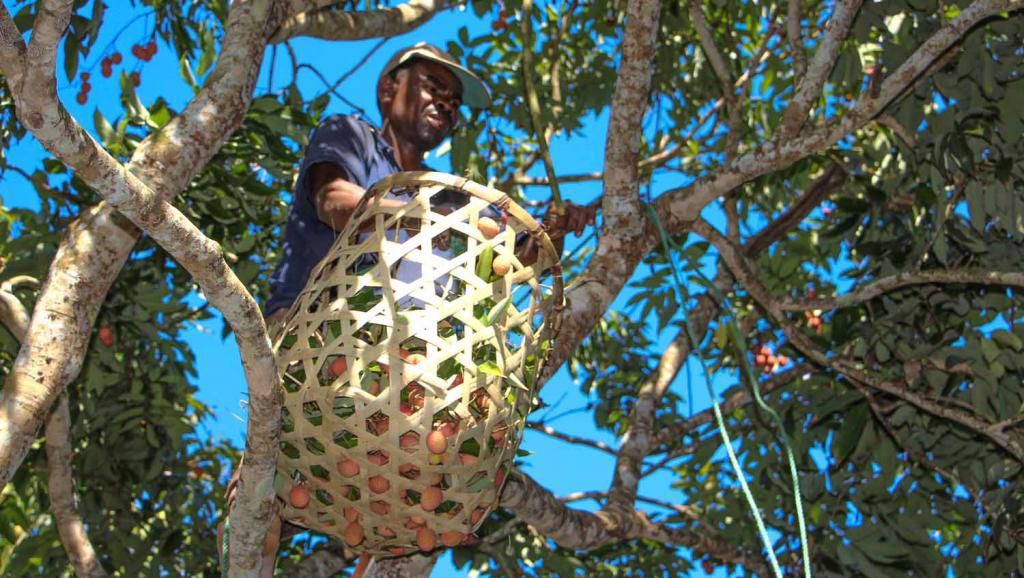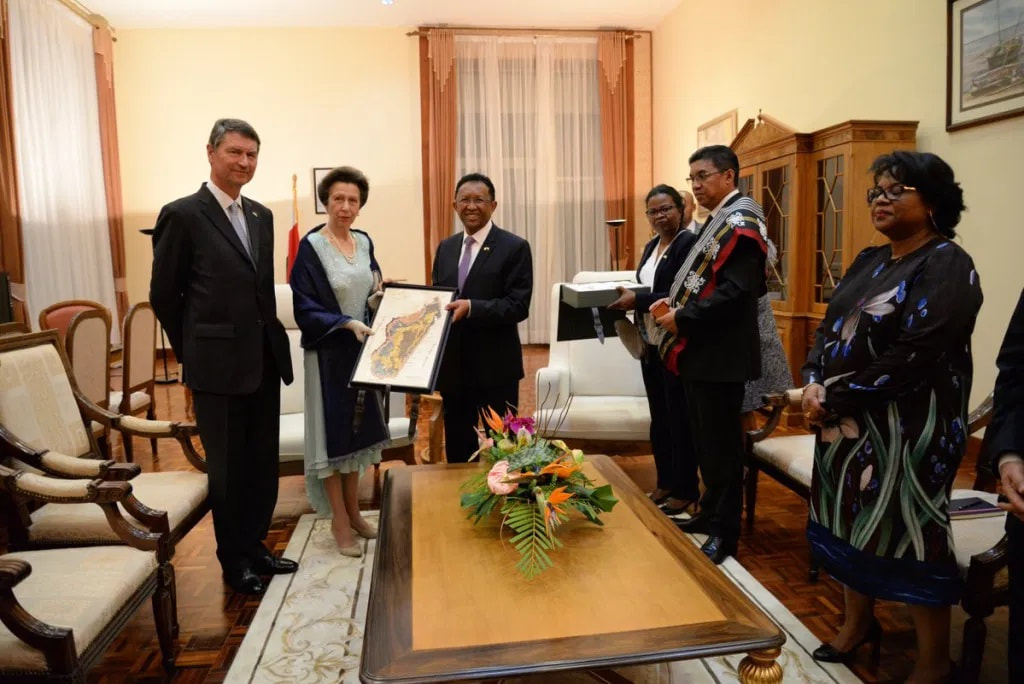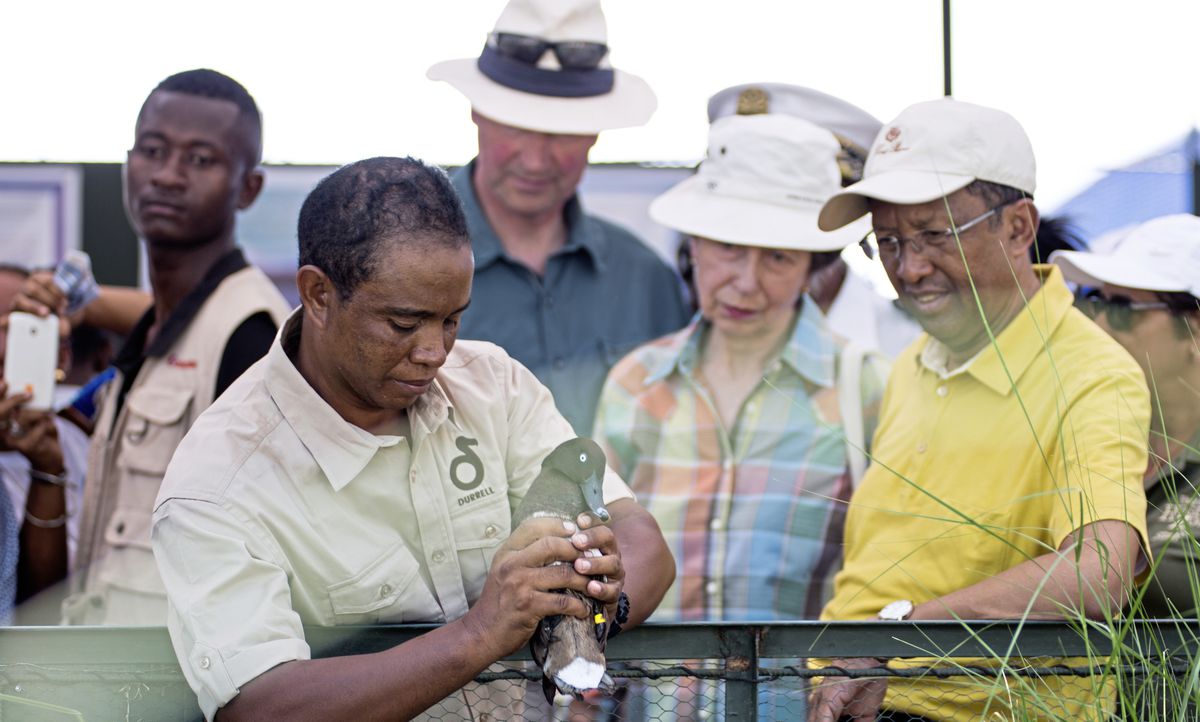Anglo-Malagasy Society Newsletter 98: December 2017 |
| ||
Society activities
The Society’s well-attended meeting in October heard three talks on different topics related to Madagascar. Dr Alison Leaf and Dr Emily Clark described their training programme Helping Babies Breathe and the impact they have had on improving healthcare for new-born children; Jackie Sutter Randriantsoa and colleagues spoke on the work of the charity Education for Madagascar and the introduction of technology via iPads into primary schools; and Sam Rowley presented his film Madagascar’s Last Paradise and described the making of it in the Masoala national park.
The first meeting in 2018 will be on Wednesday 14th March in the evening with events later in the year on Wednesday 27th June in the evening and Saturday 27th October during the day.
The details will be on Facebook and our website, which also has a summary of some of the previous talks for those unable to attend, together with much other useful information. This includes directions to the venue for our meetings, which is the Upper Vestry Hall of St George’s Church, Bloomsbury, London WC1A 2HR, two minutes’ walk from the British Museum.
The next newsletter will be published in March 2017. Please send any material for inclusion as well as any changes in your contact details to the editor Julian Cooke, whose e-mail address is [email protected].
It is with sadness that we need to record the deaths of Rory Graham, who had been a keen member of the Society’s committee until poor health forced his resignation, as well as of Nick Milner-Gulland, another active member of the Society who also passed away in November. There was an obituary in The Guardian, while Rory’s as yet unpublished book Mountains of Madagascar may serve as a tribute to him.
The first meeting in 2018 will be on Wednesday 14th March in the evening with events later in the year on Wednesday 27th June in the evening and Saturday 27th October during the day.
The details will be on Facebook and our website, which also has a summary of some of the previous talks for those unable to attend, together with much other useful information. This includes directions to the venue for our meetings, which is the Upper Vestry Hall of St George’s Church, Bloomsbury, London WC1A 2HR, two minutes’ walk from the British Museum.
The next newsletter will be published in March 2017. Please send any material for inclusion as well as any changes in your contact details to the editor Julian Cooke, whose e-mail address is [email protected].
It is with sadness that we need to record the deaths of Rory Graham, who had been a keen member of the Society’s committee until poor health forced his resignation, as well as of Nick Milner-Gulland, another active member of the Society who also passed away in November. There was an obituary in The Guardian, while Rory’s as yet unpublished book Mountains of Madagascar may serve as a tribute to him.
Politics in Madagascar
There have been a number of developments in the country since September, although the positioning for elections in 2018 has been over-shadowed by social issues such as the incidence of plague.
At a cabinet meeting on 3rd October the government, which had faced extensive criticism for its handling of the plague outbreak, blamed the mayors of Antananarivo and Toamasina, Lalao Ravalomanana and Elysée Ratsiraka respectively, for not acting to control the epidemic. Marc Ravalomanana, who acted as a special adviser to his wife in the capital, said the lack of funding had been a factor as was the difficulty of coordinating a response between different political echelons: on 5th October the heads of the fokontany or communes in the capital were obliged to take measures. President Rajaonarimampianina made his first public comments on the plague only on 10th October, by which time there had been 48 reported deaths and 449 confirmed cases; he declared that the state had sufficient weapons to fight the war on the disease.
The government had proposed a reform to the constitution to allow for the direct election of heads of the fokontany, although the proposal for a national referendum to decide on the change was seen as a distraction. Ravalomanana said the nineteen deputies in his TIM party would vote against the proposal.
In October delegations from the United Nations and the Organisation Internationale de la Francophonie each visited the country and emphasised the clear need to avoid corruption in the next election, as well as suggesting improvements in the electoral commission CENI. The commission reported that there had been an increase of 6% in the number of those registered to vote, although it was still some way short of its target of 10 million registrations. Campaigning for the elections included pitches to the country’s diaspora in France: Rivo Rakotovao of the ruling HVM party stopped off in Paris and Marc Ravalomanana announced a visit. An inter-ministerial workshop on 26th October discussed matters such as rules for the financing of candidates and met the approval of the EU ambassador, Antonio Sanchez-Benedito, which was important as the EU will provide €3.5m of funding itself to the process.
At a cabinet meeting on 3rd October the government, which had faced extensive criticism for its handling of the plague outbreak, blamed the mayors of Antananarivo and Toamasina, Lalao Ravalomanana and Elysée Ratsiraka respectively, for not acting to control the epidemic. Marc Ravalomanana, who acted as a special adviser to his wife in the capital, said the lack of funding had been a factor as was the difficulty of coordinating a response between different political echelons: on 5th October the heads of the fokontany or communes in the capital were obliged to take measures. President Rajaonarimampianina made his first public comments on the plague only on 10th October, by which time there had been 48 reported deaths and 449 confirmed cases; he declared that the state had sufficient weapons to fight the war on the disease.
The government had proposed a reform to the constitution to allow for the direct election of heads of the fokontany, although the proposal for a national referendum to decide on the change was seen as a distraction. Ravalomanana said the nineteen deputies in his TIM party would vote against the proposal.
In October delegations from the United Nations and the Organisation Internationale de la Francophonie each visited the country and emphasised the clear need to avoid corruption in the next election, as well as suggesting improvements in the electoral commission CENI. The commission reported that there had been an increase of 6% in the number of those registered to vote, although it was still some way short of its target of 10 million registrations. Campaigning for the elections included pitches to the country’s diaspora in France: Rivo Rakotovao of the ruling HVM party stopped off in Paris and Marc Ravalomanana announced a visit. An inter-ministerial workshop on 26th October discussed matters such as rules for the financing of candidates and met the approval of the EU ambassador, Antonio Sanchez-Benedito, which was important as the EU will provide €3.5m of funding itself to the process.
|
The former president Albert Zafy died of a heart attack on 12th October, soon after his transfer to a hospital on Réunion. He was aged 90 and had been president from 1993 until his impeachment in 1996, since when he had continued to be active in promoting some form of national reconciliation. There was an element of controversy over the sale by the state under the Transition regime in 2014 of the official residence where he had been living which Tabera Randriamanantsoa, the head of the Comité pour la Réconciliation Nationale (CRN) which Zafy had founded, said they would oppose; the sale was later annulled.
|
A new session of parliament opened on 25th October. The outbreak of plague added a new dimension to debates which featured the continued insecurity in the country and another motion of censure on the government, signed by some fifty members and therefore short of the numbers needed to pass. On 31st October Honoré Rakotomanana announced that he would step down as president of the Senate ceding the position to Rivo Rakotovao who had been nominated as a senator a fortnight before; his appointment was approved by 52 out of 55 votes reflecting the dominance of the ruling party HVM, of which Rakotovao is the president. The move was significant as it would mean that Rakotovao would assume the presidency of the country when President Rajaonarimampianina relinquished his role sixty days before the poll were he to stand in the next election.
In early November Rakotovao announced that the presidential elections would take place as planned at the end of 2018 and that the option of a referendum on the constitution remained open, although it faced continued opposition. The public service body SeFaFi indicated on 7th November that it did not believe there needed to be a change in the constitution at all. CENI pushed for a confirmation of the dates for the legislative elections, which might be combined with the presidential and were due by February 2019. It also announced a total of 9,223,000 registered voters with the shortfall largely due to a lack of identity cards or birth certificates as proof of identity. At the end of the month an African Union delegation commented on the lack of mutual confidence and dialogue among the parties.
In early November Rakotovao announced that the presidential elections would take place as planned at the end of 2018 and that the option of a referendum on the constitution remained open, although it faced continued opposition. The public service body SeFaFi indicated on 7th November that it did not believe there needed to be a change in the constitution at all. CENI pushed for a confirmation of the dates for the legislative elections, which might be combined with the presidential and were due by February 2019. It also announced a total of 9,223,000 registered voters with the shortfall largely due to a lack of identity cards or birth certificates as proof of identity. At the end of the month an African Union delegation commented on the lack of mutual confidence and dialogue among the parties.
|
A delegation of British parliamentarians visited Madagascar from 6th to 10th November. The members were Chris Leslie and Liz McInnes from Labour, the Liberal Democrat peers Joan Walmsley and Martin Thomas and the Conservatives Sir David Amess and Tim Loughton. The group met President Rajaonarimampianina, by coincidence on his birthday for which they had taken a bottle of English sparkling wine. Tim Loughton spoke at a plenary session of the Senate; there were meetings with the foreign, trade, justice and health ministries; visits to various charity projects and meetings with Chevening scholars; round-table discussions with businessmen and members of civil society; and insights from representatives of the IMF and World Bank as well as the electoral commission. There was discussion on the scope for Madagascar to join the Commonwealth.
|
On 17th November the parliament of the European Union passed a resolution calling for efforts to protect human rights in Madagascar while denouncing the arrests of journalists. President Rajaonarimampianina said that there was no intention of deferring the elections and the EU ambassador said there was no question of the EU ending its financial support; later in a preparatory consultation on 20th November he expressed the EU’s opposition to a referendum.
Rajaonarimampianina made a state visit to Angola and signed a co-operation agreement with President João Lourenço on 18th November. The former president of the Transition, Andry Rajoelina, was a guest at the China-Africa Investment Forum held in Marrakesh on 27-28th November.
At the beginning of December Rajaonarimampianina dismissed Nicole Andrianarivoson as one of his special advisers and appointed as one Manandafy Rakotonirina, president of the political party MFM. The National Assembly passed into law at a second attempt a proposal to create a pension fund for deputies while the government also proposed a new law allowing for the confiscation of an individual’s property even before a legal prosecution, which it was feared might be abused ahead of the election.
Not among the acts passed were three amendments to the electoral law which the council of ministers had adopted but had yet to submit to parliament, even though the president of the Senate said that the dates for the elections could not be set until they were passed. The electoral commission called for everything to be concluded and prime minister Olivier Solonandrasana said the timetable would be respected, although the decision to hold an extraordinary session of parliament in mid-January to review the proposals drew further criticism. Rumours indicated that the proposals included a change in the minimum age for candidates to 45, thus excluding Andry Rajoelina , and a maximum age of 65, neatly excluding Ravalomanana.
Rajaonarimampianina made a state visit to Angola and signed a co-operation agreement with President João Lourenço on 18th November. The former president of the Transition, Andry Rajoelina, was a guest at the China-Africa Investment Forum held in Marrakesh on 27-28th November.
At the beginning of December Rajaonarimampianina dismissed Nicole Andrianarivoson as one of his special advisers and appointed as one Manandafy Rakotonirina, president of the political party MFM. The National Assembly passed into law at a second attempt a proposal to create a pension fund for deputies while the government also proposed a new law allowing for the confiscation of an individual’s property even before a legal prosecution, which it was feared might be abused ahead of the election.
Not among the acts passed were three amendments to the electoral law which the council of ministers had adopted but had yet to submit to parliament, even though the president of the Senate said that the dates for the elections could not be set until they were passed. The electoral commission called for everything to be concluded and prime minister Olivier Solonandrasana said the timetable would be respected, although the decision to hold an extraordinary session of parliament in mid-January to review the proposals drew further criticism. Rumours indicated that the proposals included a change in the minimum age for candidates to 45, thus excluding Andry Rajoelina , and a maximum age of 65, neatly excluding Ravalomanana.
|
Dr Phil Boyle, the newly-appointed British ambassador to Madagascar, called on 5th December for the elections to be credible and inclusive, and invited all the players in the process to meet for a dialogue. His American counterpart, Robert Yamate, echoed the call for inclusivity and said that any legal impediment excluding a candidate should be made public, in an assumed reference to the sentence passed on Ravalomanana for his role in events in February 2009. The US also gave $1.2m to help to fund the elections.
|
On 19th December Rivo Rakotovao said that no candidate would be able to stand if they had a criminal record or had failed to pay their taxes, which would again exclude Ravalomanana given issues over his Tiko business empire; he responded robustly. Rajaonarimampianina said after a meeting with the EU ambassador that he was committed to holding the elections in 2018.
On 11th December, two days after International Anti-Corruption Day and a year after the legislation was passed to introduce them, the Minister of Justice, Alexandrine Rasolo, announced that the new Pôles Anti-Corruption (PAC) would come into being; the head of BIANCO said that they should help to speed up cases. The PAC were also expected to deal with the affair of Claudine Razaimamonjy, the special adviser to the president arrested in March, and the failure of three deputies and three senators to declare their assets as required.
On 11th December, two days after International Anti-Corruption Day and a year after the legislation was passed to introduce them, the Minister of Justice, Alexandrine Rasolo, announced that the new Pôles Anti-Corruption (PAC) would come into being; the head of BIANCO said that they should help to speed up cases. The PAC were also expected to deal with the affair of Claudine Razaimamonjy, the special adviser to the president arrested in March, and the failure of three deputies and three senators to declare their assets as required.
Economic and social matters
Finance and aid
In November the German government signed a series of bilateral accords with a value of €65m in support of protecting the environment and national parks, reforestation and renewable energy. The World Bank, following its previous grant of $65m a year previously, provided a grant of $45m to promote financial stability and business investment.
The World Bank noted in November that it expected the Malagasy economy to grow at 4.1% in 2017 in spite of the continued impact of the drought in the south and the costs arising from Cyclone Enawo, which it estimated at $400m (equivalent to 4% of GDP, although the money spent in repairing the damage had provided a boost in itself). The Bank noted that inflation had risen to 8.6% but was broadly under control and it forecast economic growth of 5% in 2018. It also noted as before the importance of improving state enterprises and reducing corruption; the government budget for 2018 had nothing allocated for Air Madagascar and a sharp reduction in the subsidies to the state utility JIRAMA.
At an Africa-Europe summit in Abidjan at end November the EU agreed to a loan of €120m and aid of €120m to improve the RN 13 between Ihosy and Taolanaro as well as the RN 6 between Ambanja and Antsiranana.
The International Monetary Fund in December approved a further $45m under the credit programme it had first agreed in 2016. The International Fund for Agricultural Development granted Madagascar a loan and aid worth $53m for a programme of investment.
A decline in the ariary to a rate of some 4,400:€ was attributed to lower exports of vanilla, as well as to structural issues in the economy and particular issues at the Ambatovy nickel mine.
The World Bank noted in November that it expected the Malagasy economy to grow at 4.1% in 2017 in spite of the continued impact of the drought in the south and the costs arising from Cyclone Enawo, which it estimated at $400m (equivalent to 4% of GDP, although the money spent in repairing the damage had provided a boost in itself). The Bank noted that inflation had risen to 8.6% but was broadly under control and it forecast economic growth of 5% in 2018. It also noted as before the importance of improving state enterprises and reducing corruption; the government budget for 2018 had nothing allocated for Air Madagascar and a sharp reduction in the subsidies to the state utility JIRAMA.
At an Africa-Europe summit in Abidjan at end November the EU agreed to a loan of €120m and aid of €120m to improve the RN 13 between Ihosy and Taolanaro as well as the RN 6 between Ambanja and Antsiranana.
The International Monetary Fund in December approved a further $45m under the credit programme it had first agreed in 2016. The International Fund for Agricultural Development granted Madagascar a loan and aid worth $53m for a programme of investment.
A decline in the ariary to a rate of some 4,400:€ was attributed to lower exports of vanilla, as well as to structural issues in the economy and particular issues at the Ambatovy nickel mine.
Business
In the World Bank’s Doing Business 2018 report Madagascar gained five places to 162nd out of 190 countries, with improvements in business creation and the availability of credit.
Health
At the beginning of October the prime minister banned any public gatherings in the capital to minimise future cases of pneumonic plague which had also been particularly prevalent in the port of Toamasina. Initial measures included the issuing of medicines and rat traps; face masks were in high demand and only available at a high price; the start of the new school year was postponed in some places and teaching was suspended at the University of Antanananarivo. There was a sense of panic and the government arrested those it accused of spreading false news on the outbreak as well as threatening with prison those who did not meet hygiene standards. There was a clear impact on tourism with a number of cancellations and suspended flights.
|
The World Health Organisation provided initial emergency funding of $1.5m and provided 1.2m doses of antibiotics, seen as enough to treat 5,000 cases and to protect 100,000 people. On 11th October WHO warned of the risk of the disease spreading across the nation while various partners committed $9.5m in aid. By mid-October there had been 61 deaths among 610 cases in 38 districts although a slight decrease in hospital admissions in the capital indicated that the sanitisation measures were having some impact. WHO also worked with the Malagasy Red Cross to arrange suitable burials to respect both family traditions and the need for hygiene; certain doctors suggested that the practice of famidhana had been one reason why plague was yet to be eradicated in Madagascar.
|
By 19th October the toll stood at 85 deaths out of 911 cases since 1st August, while the International Red Cross and Red Crescent launched an appeal for €4.7m to help to fund their operations. By 24th October the toll was 124 deaths out of 1,133 cases although the lack of any new incidents for a fortnight led ten districts to declare an end to the epidemic. By 27th October, by which date 141 people had died, the Pasteur Institute indicated that the situation had improved, with 22 of forty-five health districts declaring an end. On 9th November WHO and Ministry of Health said that the epidemic was now under control. As of 22nd November nine districts were still affected and the death toll had reached 202 out of 2,348 cases. On 27th November the prime minister announced that the epidemic had ended in urban areas.
There were false rumours in November of the forced inoculation of schoolchildren against the plague, which doctors feared would disrupt the planned polio vaccination campaign.
As with China, Japan, Morocco and other countries the US government provided financial support including $1m in November to support health centres and the Pasteur Institute.
Madagascar has seen one of the most significant reductions in malaria worldwide, with a drop in reported cases of 856,000 as of December compared to the previous year.
There were false rumours in November of the forced inoculation of schoolchildren against the plague, which doctors feared would disrupt the planned polio vaccination campaign.
As with China, Japan, Morocco and other countries the US government provided financial support including $1m in November to support health centres and the Pasteur Institute.
Madagascar has seen one of the most significant reductions in malaria worldwide, with a drop in reported cases of 856,000 as of December compared to the previous year.
Education
The plague epidemic caused considerable disruption. The date for the new school year was deferred to 6th November although universities remained closed for longer.
Agriculture
Rivo Rakotovao, the Minister of Agriculture, said in October that he expected further imports of rice in the order of 150-200,000 tonnes by April 2018. The World Bank in November estimated that the drought in the country had reduced rice production by a fifth. The price of rice reached 2,500 ariary per kilo at the end of November compared to 1,500 ariary a year earlier which led to some street protests, prompted the prime minister to announce measures to control the price and also provoked the President to blame a politically-motivated mafia for the rise.
A report in November indicated that there had been a 12% increase in those facing a food crisis and that some 260,000 people in the south had been affected by the drought.
A report in November indicated that there had been a 12% increase in those facing a food crisis and that some 260,000 people in the south had been affected by the drought.
|
A report on RFI indicated that the lychee industry in Madagascar was suffering from reduced rainfall which had meant the crop now ripened a month later than fifteen years previously, which meant it missed the key Christmas selling season in Europe: the country’s exports there had fallen to only 17,000 tonnes out of annual production of 120,000t.
|
Insecurity
The last quarter of the year saw continued incidents including attacks by bandits (dahalo), acts of retaliation, kidnappings and a new feature in thefts from tombs. In the three months to end October the Gendarmerie said it had dealt with 88 major cases of which 75 had been incidents of banditry or cattle theft, while there had been five attacks on national roads. The district of Tsaratanana was said to have been a particular focus, with 42 deaths in the six months to mid-December. There was further debate in November over the incident in February when the police burnt five villages at Antsakabary in a revenge attack; the government faced criticism for the fact that none of the police involved had yet to face charges while the villagers involved had already been jailed. In December in a notable incident some 800 people were reported to have stormed a prison in Ikongo in the north-east of the country in an attempt to lynch one inmate, allowing 120 others to escape.
In an interview on 29th December the prime minister Olivier Solonandrasana said that up to 10% of the budget in 2018 would be allocated to dealing with insecurity, which seemed high.
In an interview on 29th December the prime minister Olivier Solonandrasana said that up to 10% of the budget in 2018 would be allocated to dealing with insecurity, which seemed high.
Energy
Efforts by the state utility JIRAMA to cut down on theft and illegal consumption of electricity were reported in November to be having an effect. Between May and November fifty-two employees were dismissed for theft or persistent absence.
Reports
In the Mo Ibrahim Index 2017 on governance in African countries Madagascar ranked 32nd of 54 countries with a score of 49.3/100, continuing a slight improvement in recent years. However, it slipped two places to a poor 169th of 176 countries in a survey by the International Telecommunications Union on access to and use of telecoms.
The population census intended for 2017 has been deferred to 2018 given difficulties in mapping the country, with only 70% done as of November.
An article by Robyn Dixon in the LA Times in December reviewed the pressure on young girls among the Tandroy. The concern over the end to funding for family planning by USAID under the Trump administration is covered in an article by Annie Burns-Pieper in the Toronto Star.
The population census intended for 2017 has been deferred to 2018 given difficulties in mapping the country, with only 70% done as of November.
An article by Robyn Dixon in the LA Times in December reviewed the pressure on young girls among the Tandroy. The concern over the end to funding for family planning by USAID under the Trump administration is covered in an article by Annie Burns-Pieper in the Toronto Star.
Tourism
The full impact of the outbreak of plague is still not clear. There were early indications in October of cancelled bookings at a rate of 15% while on 5th October Air Seychelles suspended its flights: the country’s basketball coach had been one of the victims of the disease when at a tournament. The head of the International Tourism Organisation visited the country in November and announced that tourists had nothing to fear.
On 9th October the government confirmed the details by which Air Austral of Mauritius would become the strategic partner for Air Madagascar, taking a minority stake of 49% and investing $40m; the process had stalled since the initial agreement in May given issues over debts in the company and the Malagasy state will write off $88m by the end of the year. Air Austral then proposed Rolland Razafimaharo as the new director-general, a position he had held previously in 1996-2000.
Madagascar was included in National Geographic Traveler's list of places to visit in 2018.
On 9th October the government confirmed the details by which Air Austral of Mauritius would become the strategic partner for Air Madagascar, taking a minority stake of 49% and investing $40m; the process had stalled since the initial agreement in May given issues over debts in the company and the Malagasy state will write off $88m by the end of the year. Air Austral then proposed Rolland Razafimaharo as the new director-general, a position he had held previously in 1996-2000.
Madagascar was included in National Geographic Traveler's list of places to visit in 2018.
Minerals
Sherritt International confirmed in November its agreement to sell a 28% interest in the Ambatovy nickel mine to its joint venture partners Sumitomo Corporation and Korea Resources Corporation; Sherritt will operate the mine until at least 2024. In December the Australian company Base Resources, which has a stock market listing in the UK, took over the Toliara Sands ilmenite project from World Titane; it agreed to pay $75m for an initial stake of 85% and will buy the balance for $17m if certain milestones are met. The Ministry of Mines suspended the licence of the Chinese company mining for gold in Mananjary; other Chinese companies were reported to be operating illegally. Bass Metals Ltd, which owns the Graphmada Care project, completed the acquisition of two permits and an agreement for a third for the Millie’s Reward lithium project in Madagascar.
Wildlife and conservation
Forests and protected areas
In December the permanent committee of CITES declined to authorise the export of rosewood from Madagascar citing a lack of progress in dealing with trafficking. The Minister of the Environment, Johanita Ndahimananjara, had indicated in November that the government had met 80% of the targets although it still needed a full audit of all the stocks that had been seized.
Species
In September a paper by Society members Johan Hermans and Lauren Gardiner et al reported on ten new species of orchid in Madagascar: Cynorkis aconitiflora, C. christae, C. elephantina, C. jackyi, C. lentiginosa, C. mammuthus, C. mangabensis, C. sanguinolenta, C. siederi and C. syringescens were described for the first time, while the identity of C. elegans was clarified, and Arnottia and Physoceras were subsumed into Cynorkis.
A study by the University of Kansas published in October indicated that the Malagasy striped whirligig beetle Heterogyrus milloti had a genetic pedigree stretching back 206 million years to the late Triassic period, making it one on the oldest known creatures and a rarity in dating from before the island split from Pangea.
A report in November Primates in Peril: The world’s 25 most endangered primates 2016-2018 indicated that there had been a sharp fall in the lemur population to 2,500-3,000.
A study by the University of Kansas published in October indicated that the Malagasy striped whirligig beetle Heterogyrus milloti had a genetic pedigree stretching back 206 million years to the late Triassic period, making it one on the oldest known creatures and a rarity in dating from before the island split from Pangea.
A report in November Primates in Peril: The world’s 25 most endangered primates 2016-2018 indicated that there had been a sharp fall in the lemur population to 2,500-3,000.
Events
The Princess Royal undertook a four-day visit to Madagascar from 23rd October accompanied by her husband Sir Tim Laurence.
|
She was received at Iovolaha Palace by President Hery Rajaonarimampianina, presented Duke of Edinburgh Gold International Youth Awards to a number of recipients and attended a state dinner. She attended the Anglican cathedral of Saint Laurent Ambohimamory in Antananarivo for a ceremony to commemorate the bicentenary of the Friendship Treaty between Madagascar and the UK.
Over the next three days the royal couple visited Feedback Madagascar’s silk project at Soatanana and laid wreaths with the President at the Commonwealth War Graves Commission cemetery in Diego Suarez (Antsiranana), the burial site of over 300 Commonwealth personnel of whom 170 died during Operation Ironclad and its aftermath in May-November 1942. As patron of the Durrell Wildlife Conservation Trust, Princess Anne opened the Fotsimaso Interpretation Centre for the Madagascar pochard. |
CharitiesThere is an impressive photo gallery of the Princess Royal’s visit to the Feedback Madagascar project on their website. The charity will announce new plans in February.
There are more details of Princess Anne’s visit to the Durrell Trust’s Antsohihy centre on their website. The visit was on the eighth anniversary of the first hatching of Madagascar pochards from eggs collected from the wild. |
